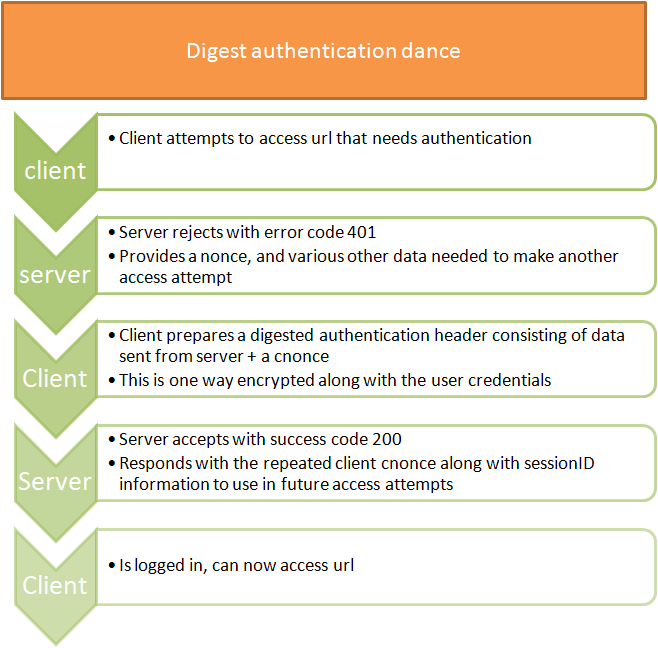The other day I was looking around for an example of how to do digest authentication in Google Apps Script (or even plain javascript). I found plenty of theoretical discussions on it, but no actual examples. So here’s an implementation walkthrough. You can include it live in your Google Apps Script Project from the mcpher shared library or just copy the code.
What is Digest Authentication
Worked example
Step 1. Initialize the workflow
// kick off workflow , expecting a 401
this.initWorkflow = function () {
this.danceStep1 = UrlFetchApp.fetch(this.url,
{ "method" : "GET", "muteHttpExceptions": true} );
return this;
};
- muteHttpExceptions is (I think undocumented) option that prevents urlfetch from crashing out and returning a null response
- this.danceStep1 WWW-Authenticate header looks like this, and a 401 status code is returned. What we need from this to construct the next request is the nonce, qop, and realm from the WWW-Authenticate header. Other implementations also return a few other things like encoding algorithm, domain and the opaque value.
- It’s quite fiddly to parse the header- for some fields there are quotes – for others there are not. I wont go into the details of that here, but the parsing code is included in the code implementation.
"WWW-Authenticate": "Digest realm="CREA.Distribution", nonce="NjM1MDQ3NzA4NDAxNzguNDpjZWQ0N2U4ODI3ZGZhYmQ4ODRkZWJhZmM5ZjllYTYwYg==", qop="auth"",
Step 2 – construct the digest
o.algorithm = "MD5";
var HA1 = bytesToHex(md5(this.credentials.username+':'+o.realm+':'+this.credentials.password));
var HA2 = bytesToHex(md5('GET'+':'+o.domain ));
var response = bytesToHex(md5(HA1+':'+o.nonce+":" + nc+":"+this.cnonce+":"+o.qop+":"+HA2));
var digest = 'Digest username="' + this.credentials.username + '"' +
',realm="' + o.realm + '"' +
',nonce="' + o.nonce + '"' +
',uri="' + o.domain + '"' +
',qop=' + o.qop +
',nc=' + nc +
',algorithm=' + o.algorithm +
',cnonce="' + this.cnonce + '"' +
',response="' + response + '"';
// sometimes opaque not given
if (o.opaque) digest += ',opaque="' + o.opaque + '"';
HA1 cfee3113c2f3ebf16863cddbc6bdcd33 HA2 e85bcbec0349f876e2ee5676ade2db50 RESPONSE a2c9f7eb682776be2ca152c4c3299d03
Step 3 – Finish the workflow
this.finishWorkflow = function () {
var options =
{ "method" : "GET", "muteHttpExceptions": true ,
"headers" : {
"Authorization" : this.digest()
}
}
this.danceStep2 = UrlFetchApp.fetch(this.url, options);
return this;
}
Where this.digest() looks like this
{
"method": "GET",
"muteHttpExceptions": true,
"headers": {
"Authorization":
"Digest username="CXLHfDVrziCfvwgCuL8nUahC",
realm="CREA.Distribution",
nonce="NjM1MDQ3NzA4NDAxNzguNDpjZWQ0N2U4ODI3ZGZhYmQ4ODRkZWJhZmM5ZjllYTYwYg==",
uri="undefined",
qop=auth,
nc=00000001,
algorithm=MD5,
cnonce="13ec921de96",
response="a2c9f7eb682776be2ca152c4c3299d03""
}
}
The Code
//---Digest authentication in Google Apps Script
function digestTest() {
var url = "http://sample.data.crea.ca/Login.svc/Login";
var creds = getRetsCredentials("tester");
// do digest auth dance
var d = new mcpher.cDigestAuth (url,creds).login();
// do something
if (d.isLoggedIn()) {
// do something .. we're now logged in
}
else {
Logger.log("all is bad");
Logger.log ("failed to log in " + JSON.stringify(d));
}
}
your credentials should come from some secret place, for example scriptDB or script properties, and should return an object like this
{username:"CXLHfDVrziCfvwgCuL8nUahC",
password:"mFqMsCSPdnb5WO1gpEEtDCHH"}
Here’s the complete code for cDigestAuth
//---class to to the authentication
function cDigestAuth(url, credentials) {
// implementation of http://tools.ietf.org/html/rfc2617
this.credentials = credentials;
this.url = url;
// workflow is try and get expected 401, construct digest and try again - should be 200
this.login = function () {
this.cnonce = new Date().getTime().toString(16);
return this.initWorkflow()
.finishWorkflow();
};
// if all has gone well we'll have got a 200 on 2nd part of workflow
this.isLoggedIn = function () {
return (this.danceStep2 && this.danceStep2.getResponseCode() == 200) ;
};
// kick off workflow , expecting a 401
this.initWorkflow = function () {
this.danceStep1 = UrlFetchApp.fetch(this.url,
{ "method" : "GET", "muteHttpExceptions": true} );
return this;
};
// finish the workflow, expecting a 200
this.finishWorkflow = function () {
var options =
{ "method" : "GET", "muteHttpExceptions": true ,
"headers" : {
"Authorization" : this.digest()
}
}
this.danceStep2 = UrlFetchApp.fetch(this.url, options);
return this;
}
// this the hard work - figuring out the digest
this.digest = function () {
// now we can handshake
var nc= "00000001";
var o = this.authSplit();
// we only know how to do md5 - TODO decide how to handle
if (o.algorithm && o.algorithm != "MD5") {
throw ("unable to deal with requested algorithm " + o.algorithm);
}
o.algorithm = "MD5";
var HA1 = bytesToHex(md5(this.credentials.username+':'+o.realm+':'+this.credentials.password));
var HA2 = bytesToHex(md5('GET'+':'+o.domain ));
var response = bytesToHex(md5(HA1+':'+o.nonce+":" + nc+":"+this.cnonce+":"+o.qop+":"+HA2));
var digest = 'Digest username="' + this.credentials.username + '"' +
',realm="' + o.realm + '"' +
',nonce="' + o.nonce + '"' +
',uri="' + o.domain + '"' +
',qop=' + o.qop +
',nc=' + nc +
',algorithm=' + o.algorithm +
',cnonce="' + this.cnonce + '"' +
',response="' + response + '"';
// sometimes opaque not given
if (o.opaque) digest += ',opaque="' + o.opaque + '"';
return digest;
};
// parse that very messy authenticate header
this.authSplit = function () {
return authSplit(this.danceStep1.getHeaders()["WWW-Authenticate"]);
}
// contains session ID etc.
this.header200 = function () {
return this.danceStep2.getHeaders();
}
// some utilities
function md5 (s) {
return Utilities.computeDigest(Utilities.DigestAlgorithm.MD5, s);
}
function bytesToHex(b) {
var s = '';
for (var i =0 ; i < b.length;i++) {
var by = b[i]<0 ? b[i]+256:b[i];
var t= maskString(by.toString(16),"00");
s += t;
}
return s;
}
function maskString(sIn , f ) {
var s = sIn.replace(/^\s\s*/, "").replace(/\s\s*$/, "");
if (s.length < f.length) {
s = f.slice ( 0, f.length- s.length) + s ;
}
return s;
}
function authSplit (aHeader, optSplitChar) {
var a = aHeader.replace(/^"|"$/g,"").replace(/^Digest /,"").split(optSplitChar || ",");
var o = {};
for (var i =0; i < a.length ; i++ ) {
// trims then splits on = ignoring - in double quotes, and knocking off quotes if present
var b = a[i].replace(/^\s\s*/, "").replace(/\s\s*$/, "").match(/(".*?"|[^"=\s]+)(?=\s*=|\s*$)/g) ;
if (b.length == 2 ) {
o[b[0]] = b[1].replace(/^"|"$/g,"");
}
else
throw("error in WWW-Authenticate response " + a.join());
}
return o;
}
}
